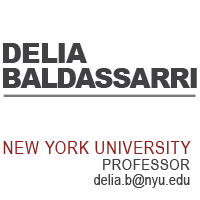NEWS
Our NYU-based research on Social Cohesion in Action has received a DoD Minerva Grant.
I have been awarded the Andrew Carnegie Fellowship for my work on political polarization in the United States.
What a 2020! Sadly, this year won’t be remembered for its science. Nonetheless, here’s some of my work that came out in the past few months:
Diversity and Prosocial Behavior Science
Market integration and generalized altruism PNAS
Culture wars and political polarization JOP
Patronage and partnership in urban governance AJS
Exposure to refugees and right-wing support Comparative Political Studies
I am honored to be the recipient of the Raymond Boudon Award for Early Career Achievement from the European Academy of Sociology and of the Hans L. Zetterberg Prize in Sociology from Uppsala University.
Don't Blame Diversity for Distrust
Maria Abascal and I wrote a New York Times op-ed.
My article, “Cooperative Networks: Altruism, Group Solidarity, Reciprocity, and Sanctioning in Ugandan Farmer Organizations," has received the Roger V. Gould Prize from the American Journal of Sociology and the Mark Granovetter Award for the Best Article from the Economic Sociology section of the ASA
My article, "Love Thy Neighbor? Ethnoracial Diversity and Trust Reexamined," written with Maria Abascal, just came out in the American Journal of Sociology.
" Time to move beyond bucolic ideas of social capital and study the building blocks of cooperation in complex societies! "
My article, “Cooperative Networks: Altruism, Group Solidarity, Reciprocity, and Sanctioning in Ugandan Farmer Organizations,” just came out in the American Journal of Sociology. Finalmente!
I am honored to be the recipient of the Freeman Award, given by INSNA (International Network for Social Network Analysis) to “a distinguished scholar in the field of social networks for significant contributions to the scientific study of social structure”.
I am the recipient of a European Research Council Starting Grant titled "INTERACT: INTerEthnic Relationships in contemporary CommuniTies: How does ethnoracial diversity aect in- and out-group trust, solidarity, and cooperation." The Grant is for the period 2015 - 2019 and is based at Bocconi University in Milan.
My article, “The Effect of Group Attachment and Social Position on Prosocial Behavior. Evidence from Lab-in-the-Field Experiments,” written with G. Grossman, just came out in PLoS ONE.
ABSTRACT: Social life is regulated by norms of fairness that constraint selfish behavior. While a large scholarship on prosocial behavior has provided evidence of such norms of fairness, large inter- and intra-personal variations in prosocial behavior still need to be explained. ...
My book, The Simple Art of Voting. The Cognitive Shortcuts of Italian Voters, just came out with Oxford University Press.
Voting distills a complex decision into a deceptively simple action. During campaign seasons, the electorate faces a messy tangle of parties, leaders, and issues. How is it possible for voters to unravel it all? How do they perceive and evaluate the political landscape? How, in short, do voters choose?
Not only is voting a complex choice, but voters themselves also vary widely in their degree of interest, and involvement in politics. Too often, though, scholars have ignored this variety by focusing on a mythic "average voter."
This book focuses on how choices are made given the cognitive limitations of the human mind and the environment in which decision-making takes place. Drawing on recent advances in the study of cognitive psychology, decision-making, and political cognition, Baldassarri provides a careful empirical examination of the strategies voters actually use to manage the complexity of political choice.
“This is a field-advancing study - the first to investigate systematically the use of simplifying heuristics to cope with the complexities of choice in a multi-party system. It is a rare example of creativity that enlarges rather than rejects the insights of previous research.”






